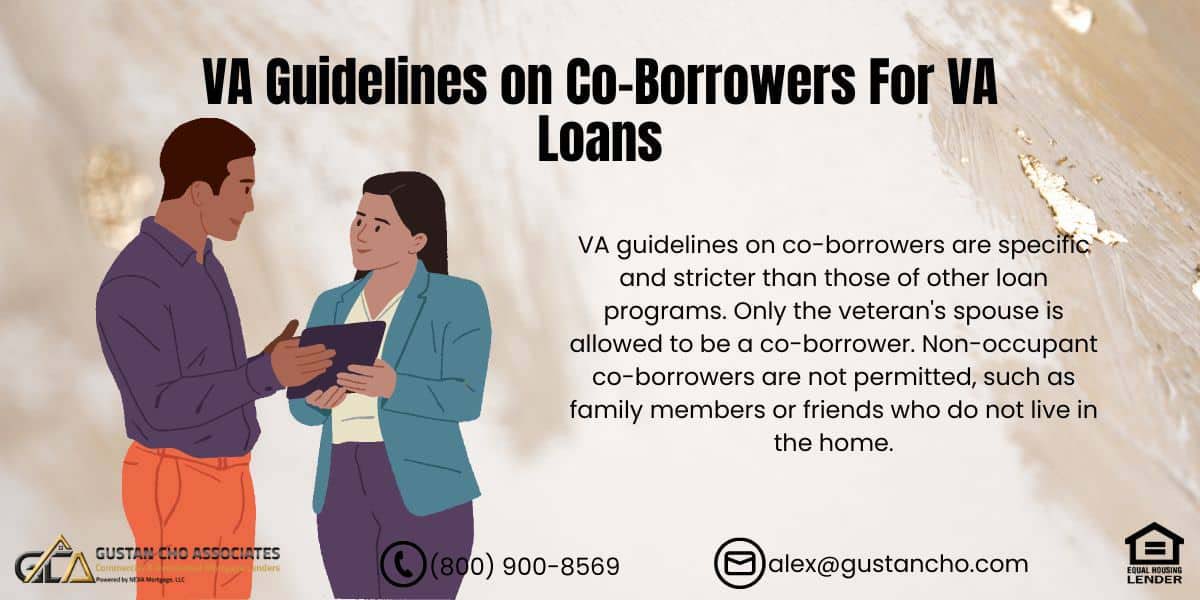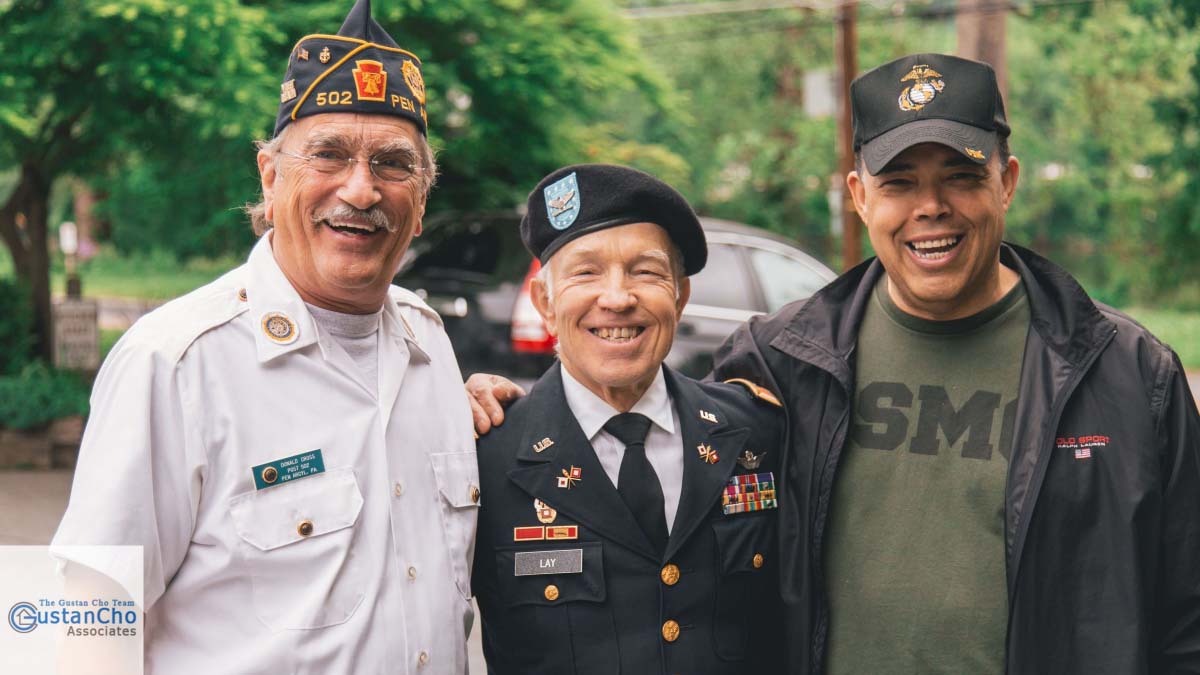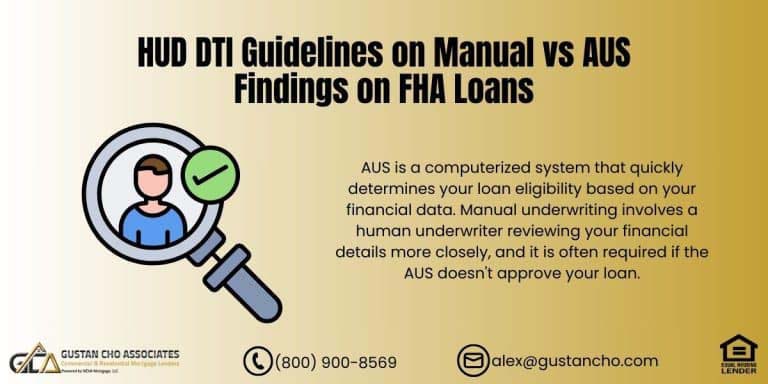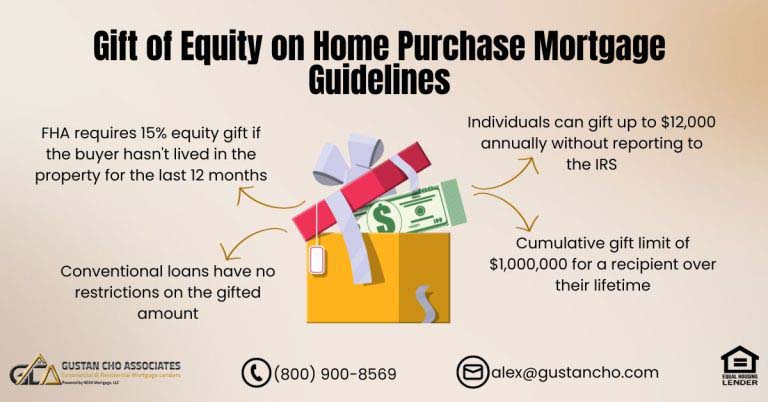This guide covers VA guidelines on co-borrowers for VA loans. We will discuss the VA guidelines on co-borrowers. Income is one of the most important factors when qualifying for VA loans. VA loans have specific mortgage lending guidelines for co-borrowers and are different than any other mortgage loan programs regarding co-borrowers. Dale Elenteny, a senior loan officer at Gustan Cho Associates and a VA loan expert, says the following about VA guidelines on co-borrowers:
VA loans are the best mortgage loan program available for home buyers. Homebuyers do not have to put any money down on a home purchase. There is no annual mortgage insurance, no maximum loan limit, no minimum credit score requirements, and no maximum debt-to-income ratio on VA loans.
Buyers can purchase a home with no money out of pocket with a VA loan. This holds true as long as you can get a seller concession from the home seller to cover the closing costs. Or, if buyers cannot get a seller concession, borrowers can get a lender’s credit from the lender to cover part or all of the closing costs.
VA guidelines on co-borrowers do not allow non-occupant co-borrowers on VA loans like they do on FHA and conventional loans. Per VA guidelines on co-borrowers only the spouse of the veteran is allowed to become a co-borrower on a VA loan. This blog will discuss VA guidelines on co-borrowers for VA home loans.
Mortgage Rates On VA Home Loans
Mortgage rates on VA loans are the lowest of any other loan program. Mortgage interest rates on VA loans are lower than mortgage rates on FHA, USDA, and Conventional loans. VA loans have no mortgage insurance premium even though the home buyer does not put any money down, and the mortgage loan is 100% financing. The Department of Veteran Affairs is the governmental entity that sets standards and VA lending guidelines on VA loans and insures VA loans. The Department of Veteran Affairs does not originate nor fund VA loans.
Planning to Apply for a VA Loan with a Co-Borrower? Let’s Navigate the Rules Together!
Reach out now to ensure you’re on the right track.Guarantee By The Department of Veterans Affairs
The Department of Veteran Affairs insures VA loans to lenders as long as the loans they originate and fund adhere to VA mortgage guidelines. Unfortunately, not all home buyers can qualify for VA loans. Only Veterans of the United States Armed Forces with a VA Certificate of Eligibility can qualify for a VA loan. Veterans with a VA Certificate of Eligibility can enjoy the great benefit of buying a home with a VA Loan with no money down and no closing costs with extremely low mortgage rates. VA loans have very lenient lending guidelines. However, VA guidelines on co-borrowers are pretty strict.
VA Guidelines on Co-Borrowers Versus Other Mortgage Programs
Every mortgage loan program has its mortgage lending guidelines about co-borrowers. VA guidelines on co-borrowers is different than other mortgage loan programs. With FHA loans, borrowers can have co-borrowers related to the main borrower. The relationship between co-borrowers and the borrower needs the co-borrower needs to be related to the borrower by marriage, law, or blood.
For someone to be eligible to become a co-borrower on an FHA loan, co-borrowers need to be a spouse, son, daughter, brother, sister, mother, father, grandmother, grandfather, step-son, step-daughter, step-brother, step-sister, step-mother, step-father, step-grandmother, step.-grandfather.
The enforcement of the actual relationship depends on each particular lender. Many lenders like myself will not check. We will take the borrower’s word on the relationship of the co-borrower to the main borrower on an FHA loan. Fannie Mae does not allow co-borrowers on Conventional Loans. However, Freddie Mac does permit co-borrowers on Conventional loans, and the co-borrower does not have to be related by blood, marriage, or law like FHA loans.
What are the Requirements for a Co-Borrower?
The requirements for a co-borrower on a VA loan in 2024 vary depending on the relationship between the primary borrower and the co-borrower. Here are the key points:
- Eligibility:
- A co-borrower can be a spouse, another veteran, or a non-veteran. However, the requirements and implications differ for each case.
- For military and non-military borrowers applying together, the VA will only guarantee the veteran’s portion of the loan. This often results in the need for a down payment to cover the non-guaranteed part of the loan.
- Financial Requirements:
- The primary borrower and co-borrower must have good credit, stable income, and meet the lender’s debt-to-income (DTI) ratio guidelines.
- A minimum credit score of 620 is typically required by most VA lenders.
- Ownership and Liability:
- Co-borrowers share equal ownership rights and responsibilities for the loan. They must sign all loan documents and are equally liable for repaying the loan.
- A down payment is usually required if a co-borrower is not a spouse or another veteran. This down payment compensates for the portion of the loan not guaranteed by the VA.
- Types of Co-Borrowers:
- Veteran and Non-Veteran Spouse: No down payment is required as long as the spouse is on the loan.
- Two Veterans: They can combine their entitlements or use one veteran’s entitlement while preserving the other’s for future use. No down payment is typically required in this case.
- Documentation:
- Both individuals seeking to borrow must submit financial paperwork like pay stubs, tax returns, and bank statements to confirm their income and financial stability.
- Down Payment:
- The down payment requirement for joint loans involving non-veterans usually amounts to 12.5% of the loan. This compensates for the risk the lender assumes due to the VA not guaranteeing the non-veteran portion of the loan.
Understanding these requirements can help plan and prepare a VA loan application with a co-borrower. Consulting with a loan officer for personalized advice is always a good step.
Need Clarity on VA Co-Borrower Requirements? We’re Here to Help!
Contact us today to get clear, personalized guidance.What is the VA Loan Nearest Living Relative?
When applying for a VA loan, applicants must provide their nearest living relative’s name and contact details as part of the application process. This requirement serves multiple purposes, primarily establishing an emergency contact and verifying the applicant’s identity and personal details.
The nearest living relative could be a parent, sibling, adult child, or any close family member, and their geographical proximity to the borrower is not a deciding factor.
The relative should provide their name, address, phone number, and their relationship to the applicant. Importantly, listing someone as the nearest living relative does not place any financial obligation on them regarding the loan; their details are purely for contact and verification needs.
Including the nearest living relative information is common in many loan application processes, not just VA loans. The details are typically filled out on specific application forms, such as the VA Form 26-1880 (Request for a Certificate of Eligibility). By collecting this information, lenders aim to maintain up-to-date records and ensure a reliable point of contact is available throughout the loan process, enhancing the overall security and reliability of the loan issuance.
What is the Maximum DTI for a VA Manual Underwrite?
The maximum debt-to-income (DTI) ratio for VA loans that undergo manual underwriting is typically limited to 50%. However, this figure can fluctuate based on various compensating factors that lenders may consider. Under basic conditions, if a borrower has no compensating factors, the upper limits for the front-end and back-end DTI ratios are set at 31% and 43%, respectively.
Should a borrower present one compensating factor, these limits can be extended to 37% for the front-end and 47% for the back-end ratio. With two compensating factors, the thresholds increase even further to 40% and 50%, respectively.
Compensating factors play a crucial role as they represent positive aspects that can offset the lenders’ risk, including a history of savings, stable employment, considerable cash reserves, or having a non-borrowing spouse with a consistent income. Additionally, borrowers with a DTI ratio above 41% must meet more stringent residual income guidelines; specifically, they must surpass the VA’s residual income benchmarks by at least 20%.
It’s important to note that while the VA provides general guidelines, the criteria can vary slightly among lenders due to individual policies or additional requirements. Manual underwriting offers a more flexible and thorough examination process, demanding extra documentation and verification, aimed at assisting veterans who may not qualify under standard automated underwriting criteria but can still repay the loan reliably.
How Many Times Can You Use a VA Loan?
Multiple uses of a VA loan are allowed if you meet the eligibility criteria and have enough remaining entitlement. Here are the key points about the reuse of VA loans:
- Unlimited Usage:
- There is no limit to the number of times you can use a VA loan as long as you have sufficient entitlement. Once you repay a VA loan in full and sell the property, your entitlement is restored, allowing you to use it again for another VA loan.
- Remaining Entitlement:
- You can use any remaining entitlement if you still own a home purchased with a VA loan and need another VA loan. The remaining entitlement is the amount left after subtracting the entitlement used for the current home.
- Restoration of Entitlement:
- Your entitlement can be fully restored if the VA loan is paid off and the property is sold. There is also a one-time opportunity to restore your entitlement even if you have not sold the property, allowing you to use your VA loan benefits again while retaining ownership.
- Bonus Entitlement:
- Sometimes, you may qualify for a bonus entitlement, which allows you to use your VA loan benefits to buy another home even if you already have an outstanding VA loan. This typically applies if the new loan amount exceeds the VA loan limit in your county.
- Funding Fee:
- The use of a VA loan incurs a funding fee for each subsequent use, and this fee might be higher for repeat use. Nonetheless, veterans with service-related disabilities might be eligible for an exemption from this fee.
Understanding these points ensures you can make the most of your VA loan benefits multiple times.
FAQs: VA Guidelines on Co-Borrowers For VA Loans
-
1. What is the VA loan nearest living relative requirement? The nearest living relative requirement for a VA loan involves providing your closest relative’s name and contact details as part of the application process. This serves as an emergency contact and helps verify your identity. The relative can be any close family member, such as a parent, sibling, or adult child. This person is not financially responsible for the loan.
-
2. What are the VA guidelines on co-borrowers for VA loans? VA guidelines on co-borrowers are specific and stricter than those of other loan programs. Only the veteran’s spouse is allowed to be a co-borrower. Non-occupant co-borrowers are not permitted, such as family members or friends who do not live in the home. This contrasts with FHA and some conventional loans, which allow non-spouse co-borrowers.
-
3. Why are VA loans considered the best mortgage loan program? VA loans significantly benefit-eligible veterans by facilitating home purchases with minimal financial barriers. These advantages include not requiring a down payment, annual mortgage insurance, or adhering to a maximum loan limit.VA loans are highly advantageous for eligible individuals due to the absence of minimum credit score requirements or maximum debt-to-income ratios.
-
4. What are the mortgage rates on VA home loans? VA loans’ interest rates are usually lower than those of FHA, USDA, and conventional loans. Despite providing 100% financing without requiring a down payment, VA loans do not necessitate a mortgage insurance premium.
-
5. What is the guarantee by the Department of Veterans Affairs? The VA insures VA loans, ensuring lenders receive a partial loan repayment if the borrower defaults. This assurance enables lenders to provide veterans with advantageous terms, such as minimal or no down payment and reduced interest rates.
-
6. What are the requirements for a co-borrower on a VA loan? Co-borrowers need to fulfill certain requirements. They should be the veteran’s spouse and, along with the primary borrower, must possess good credit, stable income, and align with the lender’s debt-to-income ratio guidelines. A credit score of at least 620 is usually necessary. Additionally, both borrowers are equally responsible for the loan and share ownership.
-
7. How many times can you use a VA loan? Veterans can use a VA loan multiple times with sufficient entitlement remaining. Entitlement can be restored once a VA loan is repaid in full and the property is sold. There is also a one-time opportunity to restore entitlement without selling the property. Some veterans may qualify for bonus entitlement if they need to exceed the VA loan limit in their county.
-
8. What is the maximum DTI for a VA manual underwrite? The maximum debt-to-income (DTI) ratio for VA loans undergoing manual underwriting is generally limited to 50%. This can be lower depending on compensating factors. Without compensating factors, the front-end DTI is capped at 31% and the back-end DTI at 43%. With one compensating factor, the limits increase to 37% front-end and 47% back-end, and with two compensating factors, they go up to 40% front-end and 50% back-end.
If you are a Veteran and would like to qualify for a VA loan, please contact us at Gustan Cho Associates at 800-900-8569 or text us for faster response. Or email us at gcho@gustancho.com. We are available seven days a week, evenings, weekends, and holidays to take your phone call or answer your emails on any questions you may have in qualifying for a VA loan.
This blog about VA Guidelines on Co-Borrowers For VA Loans was updated on May 24th, 2024.










